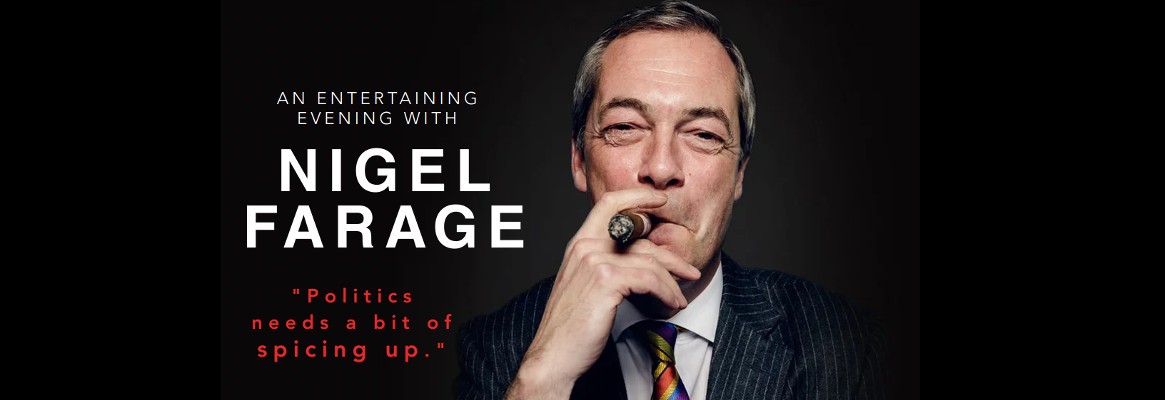Hundreds of people turned up to the Pullman Hotel in Auckland last night to see the legendary Nigel Farage on his first ever visit to New Zealand and despite the best efforts of the tolerant left, attempts to barrage the Farage proved unsuccessful.
While there were some initial fears that the event might not go ahead, after SkyCity cancelled, leading to a last minute change to the Pullman Hotel, and despite the vulgarity and abuse of a small number of misinformed youngsters and one Member of Parliament (no prizes for guessing which party), the event went ahead without a hitch.
I was privileged enough to be seated in the front row as Mr. Farage emerged for an evening described as "an entertaining evening" and which was precisely that. While many serious topics were covered, all of them were covered with Farage's signature wit and irreverent sense of humour.
The speech began with Farage referring the protesters outside, who stood outside the hotel shouting abuse at attendees and displayed vulgar placards with slogans that were about as witty, rational and convincing as a four year old child throwing a tantrum in a supermarket. I was lucky enough to avoid most of the protesters by slipping in the back entrance early, but other attendees told me that some of the protesters got right in their faces to threaten them and shout abuse.
When he arrived on stage, Mr. Farage referred to the protesters outside as a "Soros-funded rent-a-mob" and began his speech dissecting why they felt the need to protest. According to him they were either intellectually and ideologically committed Trotskyists, with perfectly rational reasons to oppose him ("although most have probably not touched an exercise book since before they started university") or it was a far more likely scenario of them being the result of institutionalised brainwashing by an academia that no longer teaches critical thinking, but instead indoctrinates.
The rest of the speech featured Farage relaying some of the stories behind his more famous moments, such as meeting Angela Merkel for the first time ("who is even more miserable in real life than she looks"), the story behind his famous "Who Are You?" speech ("We used to call Van Rompuy 'Rumpy-Pumpy' and frankly he should pay me for all the PR I've done for him") and the story of his first meeting with Donald Trump and how he was given 7 minutes to prepare his speech, not knowing that Trump wanted him to speak, after a dinner in which he had had a few to drink.
The second half of the night was a Q&A "fireside chat without the fire", which saw Farage touch on a number of topics beginning with social media in which he noted that while social media had effectively been what made him, and allowed him to "go through the back and around the mainstream media", he criticised the fact that websites like Facebook and Twitter were now censoring conservative views after realising that their platforms had been used so effectively to lead to such things as Brexit and Trump in 2016.
Farage added that he predicts that Trump may run in 2020 on a platform that features regulation of social media to prevent them from censoring anything for any reason other than violence.
Local politics were touched on only very briefly, with Farage drawing a few murmurs from the audience for referring to Winston Peters as a "brave man" and an example of the wave of populism and anti-globalism winning victories across the world.
He was also asked what he felt should be done in New Zealand, where there is no equivalent figure to him (with an audience member rather generously describing Winston Peters as "sometimes good but not in a very good position right now"), and advised people to start their own movements, parties and pressure groups especially in the wake of recent attacks on the right to free speech in New Zealand.
Farage's other main Kiwi-flavoured comment of the night was a story about New Zealand war hero Charles Upham's only other visit to the UK after the war - in which he warned British voters in the 1975 election that "blood is thicker than water, and the Germans will find a way to cheat you."
Farage noted that Upham's prediction had come true, and the people of New Zealand and other Commonwealth nations, who bled for Britain during the war, were owed an apology for their betrayal by Britain.
The night ended with a joke about Australian cricket ("I couldn't work out why they kept winning until recently!") which Farage couldn't tell in Australia.
After the speech I was lucky enough to be able to meet Farage for a quick chat, a photograph and an autograph and yes I can confirm that unlike some politicians who are nothing like their public personas, Nigel Farage is just as hilarious, friendly and genuine in person as his public persona - perhaps he is the inverse Angela Merkel after all.
For me personally, the event was a very cathartic experience - I can't remember the last time I was in a room full of people who I agreed with politically, and certainly never before in New Zealand given that there is no real UKIP equivalent. And of course it was a surreal experience - Nigel Farage has been top of my list of people I'd like to meet for some years now.
All in all it was a wonderful evening with any and all attempts to spoil it averted - because as we all know, you cannot barrage the Farage.
